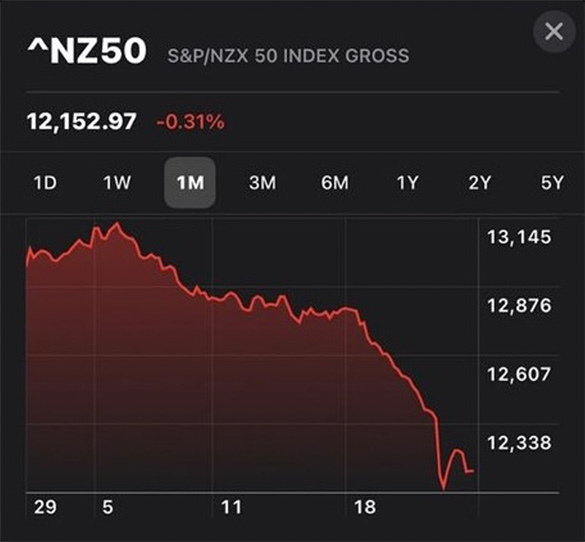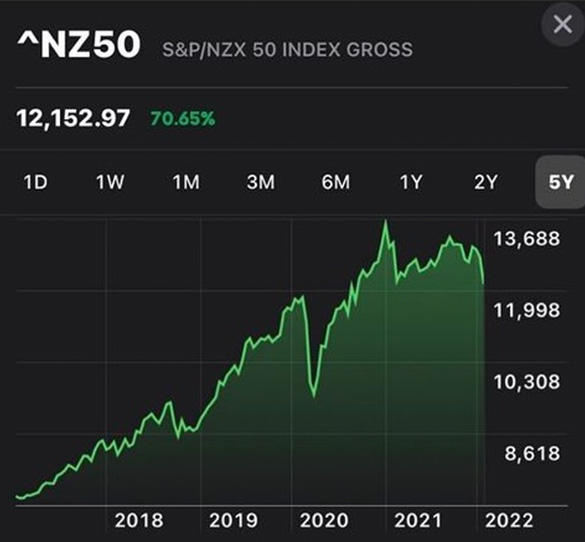Don't Panic. It’s only March.
The markets might be down and it might be a little bit scary, but we’re here to remind you that downturns in markets are just part and parcel of being an investor. This month’s blog is going to explain what a downturn is, what causes them, and what you should do when one occurs. Most importantly we’re going to try to reassure you that it’s nothing to panic about, after all, it’s only March and there’s still a little bit of summer to be enjoyed.
What is a downturn and what causes them?
To summarise it, a downturn is a decline in the economy which generally adversely impacts investments. For a lot of young investors, this downturn will be causing nerves, because it will be the first one they’ve experienced in their time in the market. A few nerves are natural, but understanding what causes a dip, and accepting that they’re a natural part of investing, can help to alleviate the butterflies.
So why does a market dip? The truth is there is very rarely one single reason or clear cut explanation as to why a market turns. More often than not it’s due to a combination of reasons; things like war and other environmental factors, increases in inflation, changes to OCRs, reductions of artificial stimulus and other factors can all contribute.
What all of the above have in common is that they are either based on or generate uncertainty. Uncertainty in turn effectively reduces confidence in the market and the market enters a period of downturn. In the case of the most recent downturn, we think the biggest contributing factors are a high inflation rate that has led to higher than expected interest rates, reduced stimulus from central banks, the political uncertainty stemming from the war in Ukraine, and the ongoing effects of the Omicron outbreak.
So, although it may seem scary when you see your investments are down rest assured that the dip is caused by very real and tangible factors that can be understood and therefore managed.
So what should you do during a downturn?
When trying to figure out what to do in the present a good place to start looking for answers is in the past. Historically investors are fast to react when uncertainty creeps in, but confidence has always returned, and usually quickly, once the initial scare has passed. The reality is markets tend to recover quickly from these types of downturns.
Take COVID-19 as an example; when it first appeared the market spooked, but confidence returned as people realised that life was going to go on. A lot of the people who did panic reacted impulsively and ignored their long term strategies. They did things like shifting their Kiwisavers from growth funds to conservative funds, therefore locking in their losses and missing any potential for a bounce-back off a recovering market (which actually occurred in the same year!)
So, the first and most important thing to do during a downturn is to ask yourself what your investment strategy is. Make yourself pause and consider how long you’re willing to invest for, what you are investing in and the resources you have assigned to those investments. If you’re playing a long term game, and we generally suggest you do, then you need to accept that dips in your investments are always going to be part and parcel of a long term strategy. If you don’t panic and change your strategy the long term growth will usually always exceed the short term losses when viewed over a long enough period.
Just take a look at the bigger picture (literally!)
With new CCCFA rules having landed this is a question we get all the time. If you’re not familiar with what the CCCFA rules are it’s worth reading our previous blog to familiarise yourself as these rules have dramatically changed the bank’s attitudes to lending money.
The banks are now almost forensic in their examination of the accounts and spending habits of people looking to borrow money. The reality is that if you want to borrow money you’ll need to ensure that your bank statements are clean for a minimum of three months. This means reducing any spending that may be seen as frivolous by the bank. Things like takeaways, nights out, retail spending etc will need to be managed tightly before your application to give you the best chance of success.
This level of financial interrogation has seen the number of accepted mortgage applications fall by 25% which has led some experts, including us, to argue that these rules have gone too far and are too invasive and prohibitive to be realistic in the long run. To put it quite simply we don’t think that you should be punished by a bank because you’ve decided to have a three-piece quarter pack after a really tough day at work, especially in an economy that will require consumer spending to keep moving.
1 month view

5 year view

And remember, there are always opportunities
One of the most legendary investors of our times once said in his Chairman’s letter to be “fearful when others are greedy, and greedy when others are fearful.” The meaning behind Warren Buffett’s infamous line has been argued many different ways, but one take is that a period of downturn or instability often presents opportunity. This opportunity arises because otherwise solid investments experience a dip in price due to the downturn in the market giving the savvy investor the chance to build them into their portfolios at a discount.
Take the recent downturn as an example; twelve months ago investors were being “greedy” as they invested in a market on its way up. Now the market has dipped these once “greedy” investors have become “fearful”, and as such the cost of some investments have dipped meaning the canny investor can purchase great investments at a discounted cost.
The danger with this strategy is when people buy with the intention of making a quick buck, we are not advocating this approach at all. Instead, we are arguing that the opportunity exists to buy solid investments with sound track-records that are going to survive the downturn and add long term value to your portfolio.
This strategy makes the most sense when applied alongside Mr Buffet’s most famous quote; “someone’s sitting in the shade today because someone planted a tree a long time ago.” This quote reflects on the value Warren Buffet sees in a long term strategy. So the smartest investors will be those who apply a long term strstegy, rather than looking at share investing as a way to make money quick. At the time of writing, this investor has stuck to his long term strategy while also purchasing additional stocks, at a discount, in some of the largest companies and funds in the world.
Still have a few butterflies?
If you’re still concerned, worried or confused about the recent dip in the market, or if you’re finding yourself tempted to change your investment strategy please just give us a call on 0800 888 482. We’re here to help you get ahead financially, and sometimes all it can take is a chat to lend confidence, a few tweaks to your portfolio or a little more information so you can make the most informed decisions.










